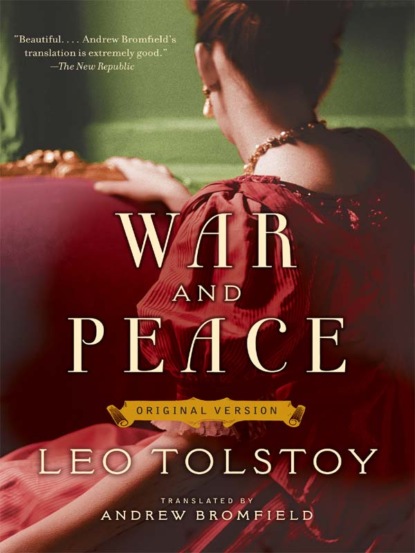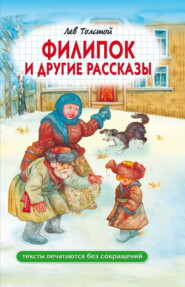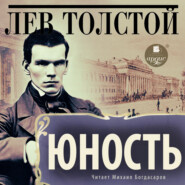По всем вопросам обращайтесь на: info@litportal.ru
(©) 2003-2025.
✖
War and Peace: Original Version
Автор
Год написания книги
2019
Настройки чтения
Размер шрифта
Высота строк
Поля
Pierre was ungainly. Fat and broad, with huge hands that seemed to have been made for swinging one-pood weights, he had no idea, as they say, of how to enter a salon and even less idea of how to leave it, that is, of how to make his farewells and say something particularly agreeable before his exit. In addition, he was absent-minded. As he stood up, instead of taking his own hat he grabbed hold of a three-cornered hat with a general’s panache and held it, tugging at the plume, until the general finally requested him with some animosity, or so it seemed to Pierre, to hand it back. But all of his absent-mindedness and his inability to enter a salon and converse appropriately within it were redeemed by an expression so good-natured and open that, despite all his shortcomings, even those whom he had placed in an embarrassing position could not help finding him likeable. Anna Pavlovna turned towards him and, expressing her forgiveness of his outburst with Christian meekness, nodded to him and said:
“I hope to see you again, but I also hope you will change your opinions, my dear Monsieur Pierre.”
To these words he made no response, but merely bowed and once again displayed to everybody his smile that said nothing, except perhaps this: “Opinions are all very well, but see what a fine, good-natured fellow I am.” And everybody, even Anna Pavlovna, could not help but feel it.
“You know, my dear fellow, your way of thinking tends to raise the roof,” said Prince Andrei, buckling on his sabre.
“I don’t mean it to,” said Pierre, lowering his head, peering over his spectacles and coming to a standstill. “How is it possible to see nothing in either the revolution or Napoleon except the personal interests of the Bourbons? We ourselves do not appreciate how much we are indebted precisely to the revolution …”
Prince Andrei did not wait to hear the end of this discourse. He went out into the entrance hall and, presenting his shoulders to the servant, who threw on his cloak, he lent an indifferent ear to the idle chatter of his wife and Prince Hippolyte, who had also come out into the hallway. Prince Hippolyte was standing beside the delightful pregnant princess and staring hard at her through his lorgnette.
“Go in, Annette, you’ll catch cold,” said the little princess, taking her leave of Anna Pavlovna. “It’s settled,” she added quietly.
Anna Pavlovna had already managed to talk over with Lise the putative marriage of Anatole and Lise’s sister-in-law and to request the princess to influence her husband.
“I am relying on you, chère amie,” said Anna Pavlovna, also quietly, “you will write to her and let me know how her father views the matter. Au revoir.” And she left the entrance hall.
Prince Hippolyte moved still closer to the little princess and, leaning his face down to hers, began saying something to her in a half-whisper.
Two servants, one the princess’s and the other his, stood waiting for them to finish talking, holding a shawl and a redingote and listening to their French speech, which they could not understand, but with expressions that suggested they did understand and did not wish to show it. The princess as always smiled as she spoke and laughed as she listened.
“I am very glad I did not go to the ambassador’s,” said Prince Hippolyte, “so boring … An excellent soirée. Was it not, excellent?”
“They say the ball will be very fine,” replied the princess, twitching her lip with the faint moustache. “All the beautiful society ladies will be there.”
“Not all, because you will not be there, not all,” said Prince Hippolyte, laughing gleefully and, seizing the shawl from the manservant, even shoving him back, he began arranging it on the princess. Either out of clumsiness or on purpose, no one could have told which, he did not lower his arms for a long time after putting the shawl in place, and appeared to embrace the young woman.
She moved away from him gracefully, still smiling, turned round and looked at her husband. Prince Andrei’s eyes were closed, he looked tired and sleepy.
“Are you ready?” he asked his wife, running his eye over her. Prince Hippolyte hastily donned his redingote, which in the new style hung below his heels, and ran out, tripping over it, onto the porch after the princess, whom a servant was helping into a carriage.
“Princess, au revoir,” he shouted, tripping over his tongue in the same way as over his feet.
Gathering her skirts, the princess prepared to take her seat in the darkness of the carriage; her husband began adjusting his sabre; Prince Hippolyte, on the pretext of being helpful, kept getting in everyone’s way.
“Permit me, sir,” said Prince Andrei in Russian to Prince Hippolyte, who was preventing him from passing.
This “permit me, sir” had a ring of such cold contempt that Prince Hippolyte hastily stepped aside and began apologising and swaying agitatedly from one foot to the other, as though in pain from some fresh wound, still raw and smarting.
“I’m expecting you, Pierre,” said Prince Andrei’s voice.
The postillion set off with the carriage wheels rumbling. Prince Hippolyte laughed fitfully as he stood on the porch, waiting for the vicomte, whom he had promised to drive home …
“Eh bien, mon cher, your little princess is very nice, very nice,” said the vicomte after he and Hippolyte had got into their carriage. “Mais très bien.” He kissed the tips of his fingers. “And perfectly French.” Hippolyte snorted and began laughing. “And you know, you are quite terrible, with your innocent ways,” the vicomte continued. “I pity the poor husband, this poor little officer posturing as some ruling prince.”
Hippolyte snorted again and said through his laughter:
“And you said that Russian ladies were not as good as French. You just need to know how to go about it.”
IX
Reaching the house first, Pierre, as if he lived there, went through into Prince Andrei’s study and immediately, as was his habit, lay on the divan, taking down the first book he came across on the shelf (it was Caesar’s Commentaries) and, leaning on his elbows, set about reading it from the middle with as much interest as if he had been immersed in it for some two hours. As soon as Prince Andrei arrived he went straight through to his dressing room, emerging into the study five minutes later.
PIERRE BEZUKHOV Drawing by M.S. Bashilov, 1866 (#ulink_98033372-4287-5dfa-94f2-a6a62c68d2e4)
“What did you do to Madame Scherer? She’ll now fall quite seriously ill,” he said to Pierre in Russian with a protective, cheerful and amicable smile as he came in, now dressed in a heavy velvet smoking jacket, rubbing his small white hands, which he had evidently just washed once again.
Pierre swung his whole body round, making the divan creak, and turned his eager face to Prince Andrei, who was shaking his head.
Pierre nodded guiltily.
“I didn’t wake up until three. Would you believe that we drank eleven bottles between the five of us?” (Pierre always addressed Prince Andrei formally, while the prince spoke to him in a more informal manner. This was a habit they had acquired as children, and it had never changed.) “Such splendid fellows. That Englishman’s a marvel!”
“That’s one pleasure I have never understood,” said Prince Andrei.
“What are you saying? You are a quite different kind of person, remarkable in every way,” Pierre said sincerely.
“At our dear Anatoly Kuragin’s place again?”
“Yes.”
“I can’t think why you associate with that trash!”
“But he really is a fine chap.”
“He’s trash!” Prince Andrei said curtly and frowned. “Hippolyte is a very bright boy, though, isn’t he?” he added.
Pierre laughed, setting his entire body shaking so that the divan began creaking again. “In Moscou there is a certain lady,” he mimicked through his laughter.
“But you know, he really is a good chap,” the prince interceded for Hippolyte. “Well then, have you finally decided on anything? Are you going to be a Horse Guard or a diplomat?”
Pierre sat up on the divan, drawing his legs under him.
“Can you imagine, I still don’t know? I don’t like either choice!”
“But you have to decide on something, don’t you? Your father’s waiting.”
At the age of ten Pierre had been sent abroad with his tutor, an abbot, and had stayed there until he was twenty. When he returned to Moscow, his father had dismissed the abbot and told the young man: “Now go to St. Petersburg, take a look around, get to know people and think about which path to choose. I agree to anything. Here is a letter for you to Prince Vasily, and here is money. Write to me about everything, I will help you with everything.” Pierre had been trying to choose a career for three months now, and he had still got nowhere. This was the choice which Prince Andrei had mentioned to him. Pierre rubbed his forehead.
“I understand military service, but explain this to me,” he said. “Why are you – you understand everything – why are you going to this war, against whom, after all? Against Napoleon and France. If it were a war for liberty, I would understand, I would be the first to join the army, but to help England and Austria against the greatest man in the world … I do not understand how you can go.”
“You must see, mon cher,” Prince Andrei began, perhaps unwittingly wishing to conceal his own vagueness of thought from himself, suddenly beginning to speak in French and changing his former sincere tone for a formal and cold one, “one can take an entirely different point of view on this question.”
And, as though everything he mentioned were his own personal business or that of his intimate acquaintances, he proceeded to expound to Pierre the view then current in the highest circles of St. Petersburg society of the political mission of Russia in Europe at that time.
Since the revolution Europe had been plagued by wars. The cause of the wars, apart from Napoleon’s ambition, stemmed from an imbalance of power in Europe. One great power was needed to take the matter in hand with strict impartiality and, through alliances, to define new state boundaries and establish a new balance of power in Europe together with a new people’s law, by virtue of which war would become impossible and all misunderstandings between states would be settled by mediation. Russia had taken this selfless role upon herself in the forthcoming war. Russia would seek only to return France to its boundaries of 1796, allowing the French themselves to choose their own form of government, and also to restore the independence of Italy, the Cisalpine kingdom, the new state of the two Belgiums and the new German Alliance, and even to restore Poland.
Pierre listened attentively, several times respectfully restraining his impulse to contradict his friend.

















